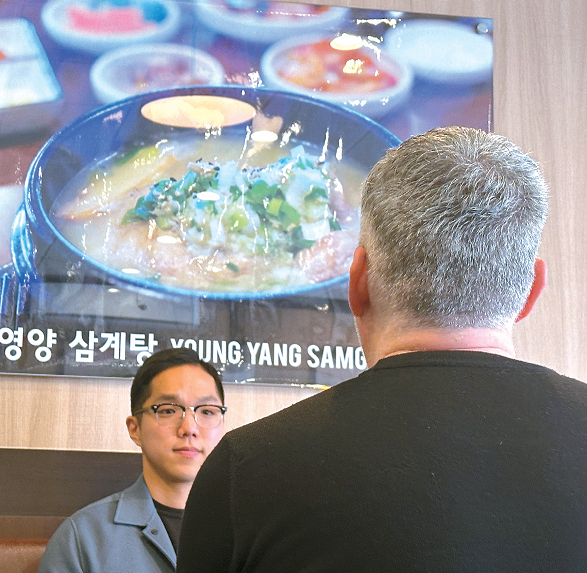LA Times’ restaurant critic Bill Addison’s food reviews go beyond flavor to culture. He’s a critic who stands by his principles. Addison does not reveal his face to the public, believing that he can only give a fair critique if the restaurateurs do not recognize him when he reviews.
When asked about Korean food, Addison looked at the menu and suddenly turned to the weather.
“I think I’ll have Samgyetang (ginseng chicken soup) today. It’s cloudy, and so soup it is.”
The kind of Korean food Addison wishes to find the most is “authentic Korean food,” the dishes that Koreans really eat in Korea, not the fusion cuisines that have catered to American tastes.
“I am the most average American,” he said, picking up his cutlery.

What comes to mind when you think of Korean food?
“Korean barbecue, so far. I think it’s the most widespread Korean food. One of the dominant food cultures in America is meat-centered, especially beef. Grilling meat in smoke and the sweetness of the food is favored in white, mainstream culture. Korean barbecue is a perfect example of this. It’s also fun to watch the meat being grilled in front of you, so it’s bound to be well received.”
What are the unique flavors of Korean food?
“It’s a complex spicy flavor with sweetness and spiciness. The flavors of Korean food often overlap with Japanese and Chinese food. But I think Korean spiciness is the best example to describe the flavors of Korean food. It is different from the sour-spicy flavors that Americans are used to, which makes it different and more palatable.”
The Korean spiciness varies.
“People now understand the difference between the spiciness of fermented kimchi and the spiciness of gochujang (red pepper paste). And as time goes on, more of them will. Just about ten years ago, the American media couldn’t differentiate between different spiciness of Korean food. They were lumped together and called Korean chili powder or Korean spice sauce in general. Now it’s called gochujang, a proper name it deserves. A lot of people know the word gochujang.”
Authentic Korean food versus Korean fusion food.
“First, I want to understand the concept of authentic Korean food so that I can understand the origin of reinterpreted Korean food. If you know authentic Korean food, then when you go to a fusion restaurant, you can see the chef’s intention. This is true for all genres of food, not just Korean. That’s not to say that you should rule out fusion Korean food. If you try fusion first and you like it, you might find yourself craving authentic Korean food. It can also help people better understand Korean food and expand their horizons.”
What is one strength of Korean food?
“Korean food has the ability to naturally infuse into American food. When elements of Korean cuisine are added to the American cooking process, it works well. This also shows how well Korean food fits into the diverse and ever-changing American palate. For example, there’s a place in Atlanta called Heirloom Market BBQ. They serve Southern-style barbecue with sides but with a Korean twist that makes it better than other barbecue restaurants along the street.”
To what extent has Korean food penetrated American food culture?
“It has a lot already. Thanks to the Hallyu influence, we’ve been exposed to a lot of songs, movies, and fashion, but also food. Americans cook a lot of dishes using kimchi. Many mainstream restaurants serve kimchi as a side, and the number of Korean restaurants has also increased. Recently, there have been more Korean-American chefs in the U.S. expressing Korean food in their own way, and more Korean restaurants are entering the U.S. as well.”
Will Korean food’s popularity continue?
“I don’t think it will ever go away, but there are always fluctuations. The continued interest in Korean food depends on Koreans. It can’t always be Korean barbecue or chicken. Showcasing traditional and diverse Korean food will not only present Korean flavors but also the country’s unique food culture and history.”
BY KYEONGJUN KIM, HOONSIK WOO [kim.kyeongjun1@koreadaily.com]



![Column: An Era When Green Card Interviews End in Handcuffs (Left) Tae-ha Hwang and wife Xelena Diaz at the USCIS Los Angeles office, where Hwang was detained mid-interview. (Right) The marriage certificate submitted for Hwang’s marriage-based residency petition. The photo has been blurred for privacy reasons. [Courtesy of Xelena Diaz]](https://www.koreadailyus.com/wp-content/uploads/2025/12/1208-newsletter-Hwang-100x70.jpg)
